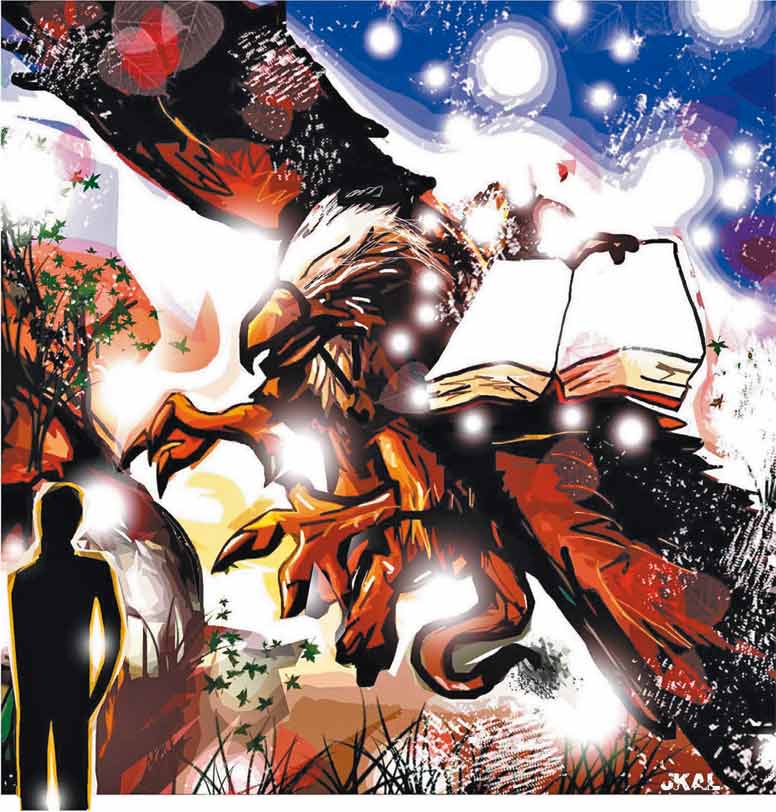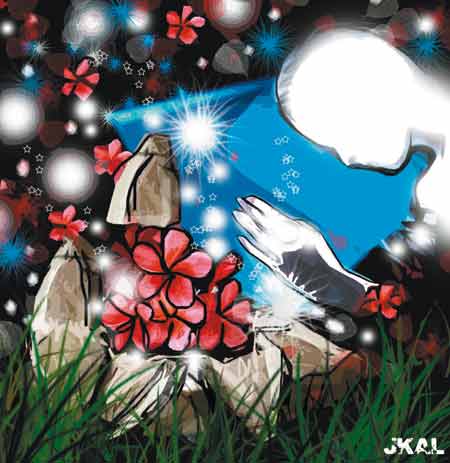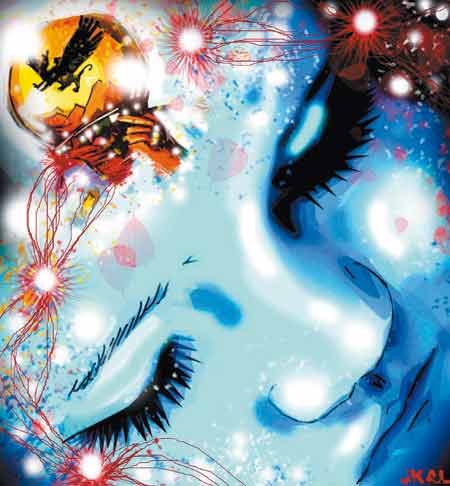| |
| |
 |
|
2009, griffins and revolutions |
| |
| Silo Text Kalvellido illustrations |
| |
Readers of this edition ofthe magazine are offered a chapter from the story “El día del León Alado” (The day of the winged lion), taken from Silo’s book of the same name. It is a story whose language evokes opportunity, mobility and change; particularly significant themes for the political and socioeconomic circles in which we generally find ourselves. This is a story whose message is not restricted to a single historical context.
It is my hope and desire that these words provide a gradually awakening human awareness with the same freedom and gratification that I experience every time I read them. I hope they spring to mind every time the future looks dark and oppressive and help ensure that every day of this year becomes a genuine revolutionary creation.
Michel Balivo
|
The Living Characters
Tenetor III paused at the mouth of the cave, preparing to step into the external space. “But what external space?” he asked himself. Were he to remove his helmet he would find himself seated in the anechoic chamber. Troubled by this question, he remembered the disappearance of Tenetor II and the incoherent data recovered from the crystal when it was activated: a monotonous holograph in which the explorer appeared, singing a long, plaintive song. That was all.
But he also remembered the voice of his teacher. He remembered the poetry that in times past had flowed from his instructor like a sea breeze. He heard the music of strings and the sound of synthesizers. He saw phosphorescent canvases and paintings growing on the flexible manganese walls. Once again his skin brushed against the sensitive sculptures. From his teacher he had received an understanding of that art which touches the deepest reaches of being, as deep as Jalina’s black eyes, as deep as that mysterious tunnel. He took a deep breath and started toward the exit to the cave.
It was a beautiful afternoon, resplendent with color. The low sun outlined the mountains in red, and the two rivers in the distance followed their serpentine paths of silver and gold. Then Tenetor III was witnessing the scene that the holograph had partially shown. There sat his predecessor, singing toward Mesopotamia:
Oh, Father, call up the sacred letters from the depths.
Bring near that fount in which I could always see The spreading branches of the future!
As the song multiplied in distant echoes, there appeared in the sky a tiny point, approaching rapidly. Tenetor adjusted his zoom to the appropriate distance, and could clearly see the wings and head of an eagle, the body and tail of a lion, the flight of a majestic ship—living metal, poetry and myth in motion, reflecting the rays of the setting sun. The song continued as the winged figure displayed its profile, extending its powerful lion’s paws. Then there was silence, and the celestial griffin opened its enormous ivory beak, answering with a shriek that echoed throughout the valley, awakening the power of the serpent beneath the earth. Large boulders broke loose, raising clouds of dust and sand with their fall. But everything was suddenly calm as the animal gently descended. Before long a rider leaped down before the man, who was thankful for the long-awaited presence of his father.
From a saddlebag on the griffin, the rider brought out a huge tome, as old as the world. Later, seated on the multi-colored rocks, father and son breathed in the air of the late afternoon. Having passed a long time in contemplation, they were thus prepared, and opened the ancient volume. On each page the cosmos was made visible. In a single letter they saw the movement of spiral galaxies, of open and globular clusters. In the dance of characters on the ancient parchment they could read the motions of the cosmos.
In time, the two men (if indeed they were men) rose to their feet. The elder, with flowing, rumpled, wind-blown clothing, smiled as no one else in this world could ever have smiled. In his heart, Tenetor III heard the following words: “A new species will open to the Universe. Our visit has come to an end!” That was all.
Nothing more.
Tenetor watched as the serpentine gold and silver rivers that lay before his eyes were transformed into the arteries and veins running through his body. His lungs appeared on the small display in his visor, bearing witness to his heavy breathing. From this he began to understand the source of the griffin’s beating wings, and he knew that in some region of his memory he could find the mythic images he had seen take shape with such striking reality. As he decided to return to the cave, he observed the stream of alphanumeric information scrolling down the edge of his visor. Immediately, the small display showed the infinitesimal movements his images were inducing in his legs, and with this he entered the cavern. “I know what I’m doing,” he thought. “I know what I’m doing!” But these words, which he spoke to himself, resounded outside of him, reaching his ears from the outside. As he looked at the rock wall, he heard words referring to it. He was breaking through the barrier of naming, in which all the senses mix. Perhaps for this reason he remembered the poem his teacher used to recite:
|
 |
| |
A noir, E blanc, I rouge, U vert, O bleu:
voyelles.
Je dirai quelque jour vos naissances latentes(1)
Then he saw a rock whose edges opened, blossoming like colored flowers. And in that kaleidoscope of hues he realized that he was breaking through the barrier of vision. He moved beyond each of his senses, as when profound art touches the very limits of the space of existence.
Pulling off his helmet, he found himself in the anechoic chamber, but he was not alone. For some reason, the entire subcommittee was present. As Jalina kissed him softly he could sense the group’s impatience.
“I’m not saying a word!” were Tenetor’s shocking first words. But then he added that he would document everything in a report that should not be shown to the other members of the group until everyone had had their turn. Thus it was decided that all the members should make their own journeys into pure virtual space. In the end, this would allow them to process data that would be free of any influence from the others. Only then would it be appropriate to begin the discussion, because if it turned out that everyone in fact recognized the same landscape in pure virtual space, this would mean that the Project could be realized.
But even then how could it possibly extend its reach throughout the world? Perhaps the answer was the same as for any new technology. Besides, there were distribution channels that already existed thanks to this network of exceptional people who were so much more than the empty husks that much of humanity had been reduced to. He knew now that he did indeed exist, that all the others existed, and that this was the most important point on a long list of priorities. |
| |
| Then he saw a rock whose edges opened, blossoming like colored flowers... |
| |
 |
| |
|
No Support for Planetary Colonies!
“Good morning, Mrs. Walker.”
“Good morning, Mr. Ho.”
“I imagine you’ve seen this morning’s report. And if you have, then I suppose you noticed in checking the bulletins that there has been a decision to intervene in the question of planetary colonies.”
“That’s right, Mr. Ho. You’re absolutely right. No one on Earth is going to support an effort of that kind until there’s an end to the monstrous situation where even a single human being lives below the standard of living that the rest of us enjoy.
“I’m glad to hear that, Mrs. Walker. Very glad indeed! But tell me, exactly when did everything begin to change? When did we first realize that we exist and, therefore, that the others exist as well? Right now, I know that I exist. It sounds pretty silly, doesn’t it, Mrs. Walker?”
“It’s not silly at all. I exist because you exist, and vice versa. That’s the reality, and it’s everything else that’s silly. I think the guys from the—what’s it called?—‘The Deficient Intelligence’ or something like that?”
“The Committee for the Defense of the Weak Nervous System. No one remembers them. Which is why I’ve dedicated a poem to them.”
“Good. Very good. Well, they certainly managed to straighten things out. I don’t really know how they did it, but they did. If it wasn’t for them, we’d all have become ants or bees or trifinus melancolicus! There’s no way we could have known what was about to happen. At least not for along time. And we might not have experienced what we’re experiencing right now. I’m only sorry that Clotilde and Damian and so many others didn’t make it to see the changes. They were really desperate, and the worst part was that they didn’t know why. But let’s look to the future.” |
| |
I dreamed it

|
| |
“That’s it—you’re right, of course. The entire social organization, if you can call it that, is collapsing. It’s come undone in such a short time. Amazing! But this crisis is definitely worth it. Some are afraid because they think they’re going to lose something. But what have they got to lose? We’ve already started to give shape to a new society. And as soon as we get our house in order, we’ll make another leap forward. That’s when we’ll see planetary colonies, galaxies, and immortality. I’m not worried about us falling into some new kind of idiocy in the future, because by then we’ll have grown. It seems that it’s in the most difficult moments that our species is able to get it together.”
“They started with those virtual reality programs. They designed them so that everyone wanted to play, and soon people were realizing that they weren’t cardboard cutouts themselves. They discovered that they existed. The kids were the ones who got things going, but it would have happened in any event, though maybe not as fast. People took things into their own hands. Did they ever! The end of history was spectacular—eighty-five percent of the people in the world either saw or dreamed the winged lion and heard the words of the visitors when they returned to their world. I saw it. What about you?”
“I dreamed it.”
“It’s the same. I know this is the first time we’ve talked, but could I ask you a big favor?”
“Of course, Mrs. Walker. We’re living in a new world, and it can still be hard for us to find ways to communicate openly with each other.”
“Would you read me your poems? I imagine they’re inefficient, arbitrary, and above all, comforting.”
“That’s right, Mrs. Walker. They’re inefficient and comforting. I’d be glad to read them to you any time. Have a marvelous day.”
(1)“The opening lines of the poem by Rimbaud:
“A black, E white, I red, U green, O blue;
/ Someday I’ll tell your latent birth O vowels.”
* Mario Luis Rodriguez Cobos |
| |
|



